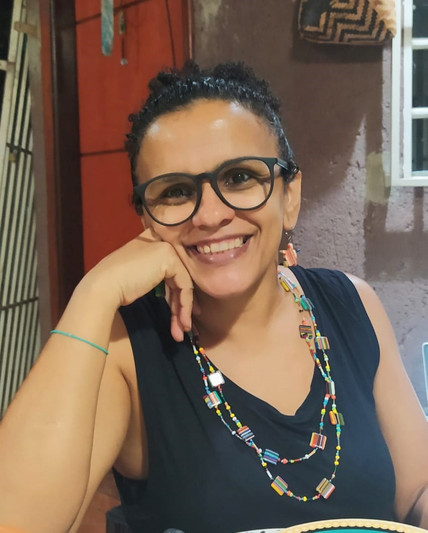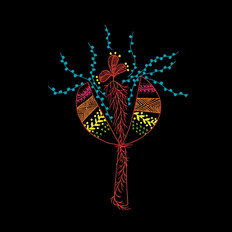
Indígenas.br - Indigenous Music Festival - Schedule 09/09
09/09 – Thursday – 7:00pm
Documentary show
— Guajajara & Kanela Indigenous Stories and Songs — Guajajara Tentehar People — Lagoa Quieta Village — Arariboia Indigenous Land — Amarante (MA) — Director: Diego Janatã and Djuena Tikuna — 2021
— Guajajara & Kanela Indigenous Stories and Songs — Guajajara Tentehar People — Maçaranduba Village — Caru Indigenous Land — Alto Alegre do Pindaré (MA) — Director: Diego Janatã and Djuena Tikuna — 2021
Chat
— Indigenous presence in Maranhão — Diego Janatã and Ligia Soares. Mediation: Magda Pucci
— Guajajara & Kanela* Indigenous Stories and Songs — Guajajara Tentehar People — Lagoa Quieta Village — Arariboia Indigenous Land — Amarante (MA)
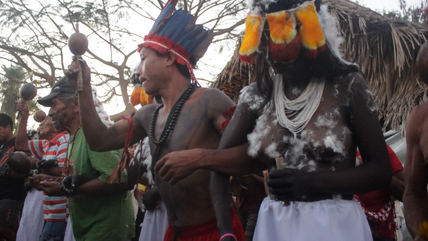
This documentary shows the songs that echo the Guajajara Tentehar culture in the Araribóia Indigenous Land, a region of renowned fame for being the territory of valuable singers. These are generations that perpetuate ancestral singing, cheering their Mayra in the rituals of Moqueado (Wyra’o haw), Allowances and Festivities of Honey (Zemuishi o haw). In the last decade the Guajajara people lost their greatest singers, the Tumui Vicente of the village Araribóia, Chicão da Lagoa Comprida and Abrahão do Juçaral. Singers regarded as great masters who have passed to their disciples the knowledge of tradition. The main representatives of this new generation of singers were interviewed for this documentary. Also noteworthy is the initiative of the indigenous leaders who created the Tentehar Tukán Knowledge Center, to be another space for youth to keep their singing alive and to make the sound of the Maracá who carry the voice of the spirits be heard.
Director: Diego Janatã and Djuena Tikuna
Year: 2021
Singers/Testimonials:
David Guajajara
Milton Guajajara
Zee Maria Guajajara
Fabiane Guajajara
Maria Santana Guajara
Silvio Santana Guajara
Guajajara & Kanela* Indigenous Stories and Corners — Guajajara Tentehar People — Maçaranduba Village — Caru Indigenous Land — Alto Alegre do Pindaré (MA)
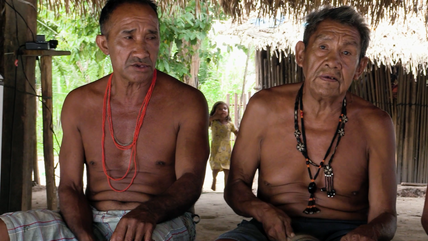
This documentary is a valuable record of the cultural resistance narratives of the guardians of the singer Guajajara Tentehar, in the Caru territory, in the Amazon of Maranhão, who also establish a special relationship with their relatives of the Tembé Tentehar people, coming from the neighboring State of Pará. It is the old guard of singers who packed for many summers the “Rituals of Moqueado” on the moonlit nights of the villages bathed by the Pindaré River. They evoke in their corners the ancestry linked to the forest, inheriting singings taken in honor of the beings that inhabit the forests, rivers and the sky. These singers want to pass the maracá to the new generations, however, they find difficulties, so they seek support for young people to hear this call.
Director: Diego Janatã and Djuena Tikuna
Year: 2021
Singers/Testimonials:
Manoelzinho Guajara
Antonio Guajajara
Joao Guajajara
Nelson Tembe
Mariazinha Guajajara
Marcilene Guajajara
Chat — Indigenous Presence in Maranhão
Participants: Diego Janatã and Ligia Soares
Mediation: Magda Pucci
Indigenous artist and journalist Djuena Tikuna and journalist and musician Diego Janatã direct three mini-documentaries produced especially for the CCVM Indigenous Music Festival. In this chat, he tells the recording process of the singers of two important peoples of Maranhão who live in three villages Maçaranduba, Lagoa Quieta and Escalvado. The melodies in the voices of the singers and singers of the Guajajara Tentehar and Kanela Rankokamekrá peoples pack the narratives of resistance and protagonism to keep these cultures alive.
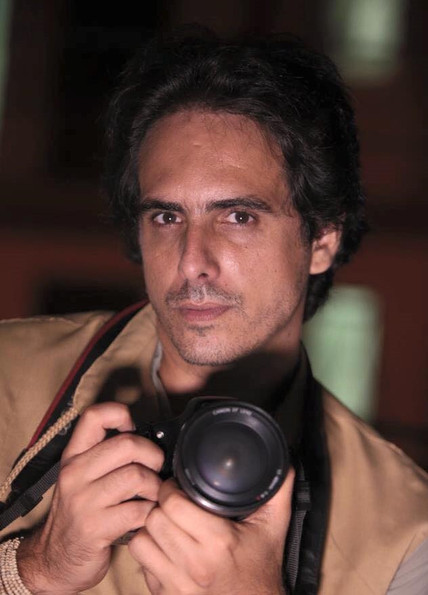
Diego Janata
Diego Janatã from Maranhão has traveled through various indigenous communities throughout Brazil, researching and recording the musicality of forest peoples and also the sound of the drums of the quilombola and traditional communities of Maranhão and other parts of the Amazon.
As a documentary photographer, he has dedicated himself to recording the various manifestations of the rich indigenous culture in the region, working especially with the Guajajara Tentehar peoples and also with the Tikuna people, from the Alto Solimões region, in Amazonas, on the border of Brazil with Peru and Colombia.
Always willing to experience the traditions of popular culture, as a percussionist Janatã was a student of Master Eliberto Barroncas, renowned multi-instrumentalist, visual artist and immortal of the Amazonian academy, founder of the Raízes Caboclas group,
One of the greatest references of organic music in the north of the country. Janatã is also a disciple of Master Castro, love of Bumba Meu Boi de Pindaré, one of the most traditional in Maranhão and founder of Tambor de Crioula Punga Baré, precursor of the genre in Manaus – AM. Currently Janatã is producing, alongside singer Djuena Tikuna, a musical research project included in the Natura Musical Notice, one of the most prestigious in the country. The artist was also nominated alongside Djuena Tikuna, for the Indigenous Music Awards, the largest award for indigenous music worldwide.
Ligia Soares
Graduated in Social Sciences (Bachelor and Degree) from the Federal University of Maranhão, Master’s Degree in Environmental Sciences (UFT) and PhD in Anthropology from the Federal University of Amazonas (UFAM) with sandwich internship at the Smithsonian Institution (National Museum of Natural History and Folkways). Has experience in Anthropology, with emphasis on Indigenous Ethnology, Ethnomusicology and Anthropology of Art. She is an effective researcher at the Center for Studies and Indigenous Affairs of UFT and INCT Brasil Plural – UFSC/UFAM/UFRN/UFMT/UFT, and is a collaborating researcher at the Timbira Center for Teaching and Research Penxwyj Hempejxá/CTEPPH located in the city of Carolina – Maranhão.

